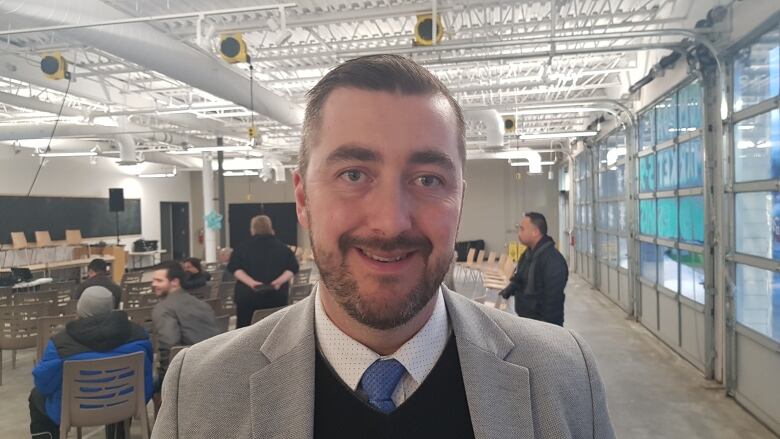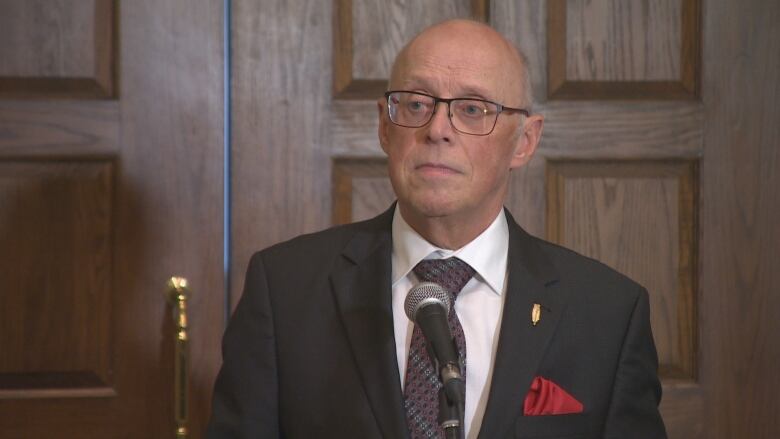Basic income could keep disease at bay in N.L., says Health Accord board member
57 recommendations include anti-poverty measures

Improving Newfoundland and Labrador's health outcomes begins with addressing factors outside the health-care system, according to a board member who helped a new report crafted by the province's Health Accord.
The Health Accord, which released its long-awaited report on Friday, is split into two categories to help make the province's population healthier: rebalancing the health-care system, and working to improve the social determinants of health, according to Josh Smee.
"Things like your income, your education, your housing, your work conditions, your state of food security all those have really meaningful health outcomes down the line," Smee, who also works as the CEO of Food First N.L., told CBC NewsonMonday.
"That range of things, the social determinants, impacts your health way more than the health-care system does."
The report makes 57 recommendations,ranging from centralizing emergency services to creating a provincial basic income plan.
The addition of a basic income plan is a key recommendation for Smee, who says poverty is often at the root of issues like food security, housing and education which can also affect health outcomes.
The report outlines three possible methods to running a basic income plan.
First, the provincial government could send every resident a set amount of money per month, and tax it back from the people who don't need it at the end of the year. Second, the province could implement a "top-up"system if a person's income is below a certain threshold. Third, a basic income plan could replace something like income support in the form of a monthly check.
"There's pros and cons for each way of doing it, but basically the goal is that no one ever falls below a certain basic floor and you know that that floor is underneath you, no matter your circumstance," Smee said.
"You'd end up with big savings in the health-care budget down the line, because so many of these social determinants affect health."
However, basic incomeshouldn't be viewed asan opportunity to cut other programs, he said, addingthe program could costhundreds of millions of dollars, depending on how it's designed.
The provincial House of Assembly voted resoundingly on a non-binding motion in late 2020 to examine a basic income pilot program in Newfoundland and Labrador, but the all-party committee to research it never materialized.
Recommendations will be considered: Haggie
Health Minister John Haggie said the initiative would likely be as much a federal decisionas a provincial one.
"There are all sorts of possibilities there, and indeed there's evidence from abroad accumulating that might inform those decisions," Haggiesaid.
"But that's not going to be a Newfoundland and Labrador sole decision, because that's going to come down significantly to roles of the federal government and whether or not they're prepared to finance those kinds of things here."

Now that the recommendations are on the table, it's now up to Haggie's office to adopt the calls to action. He called the recommendations, especially those outside the health-care system, "a real endorsement of health in all policies."
"We've been working as hard as we can on some of these issues. The challenge is that just like the front-line health-care workers, 85 per cent of the work of the Department of Health has been COVID-19," Haggie said.
"As this wave hopefully recedes and we open up to something approaching a new normal, staff who would deal with those issues will be free to deal with [the Health Accord]."
Part of that work has already started through collaborative community-care teams, which Haggiehas previously said will be operational across regional health authorities by the end of March.
The teams can often include primary health-care providers like physicians, nurse practitioners andpharmacists, with Haggie adding other occupations like housing support workers and income support staff could be involved in the future.
The registered nurses' union in Newfoundland and Labrador says recruitment and retention should be high on the priority list.
"We must take action now to improve the health of Newfoundlanders andLabradorians," union president YvetteCoffey said Friday.
"Investing in the Health Accord N.L. recommendations will lead to better health outcomes in the long term. The cost of doing nothing will be far greater because health outcomes will not improve and our system will become even less sustainable."
With files from The St. John's Morning Show and Newfoundland Morning












_(720p).jpg)


 OFFICIAL HD MUSIC VIDEO.jpg)
.jpg)



























































































